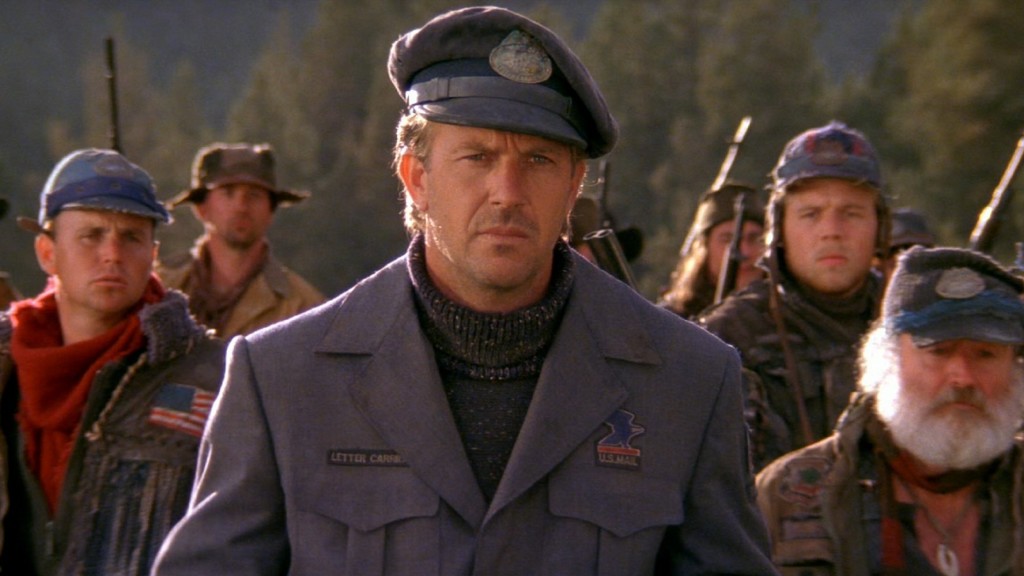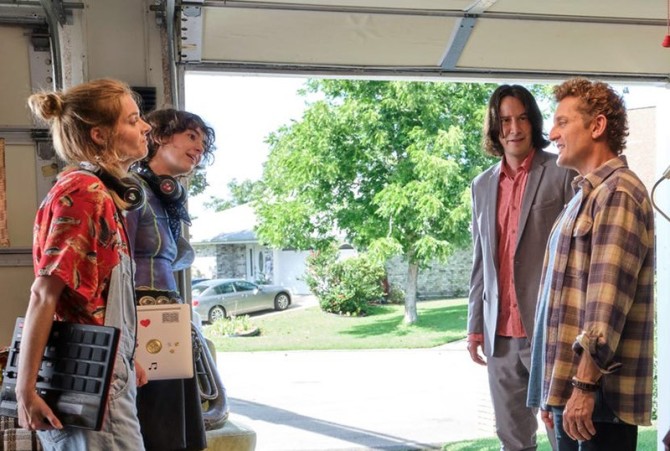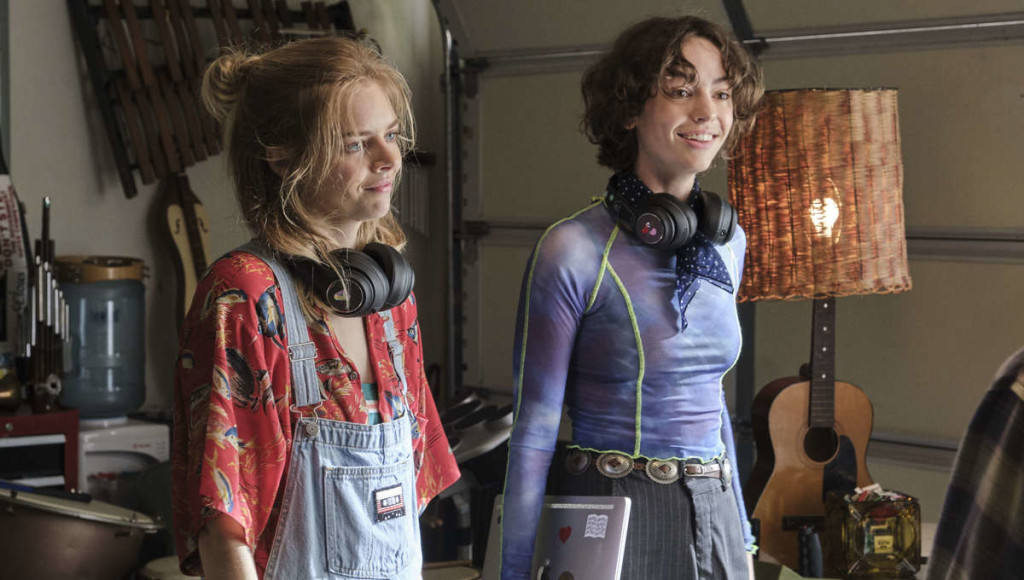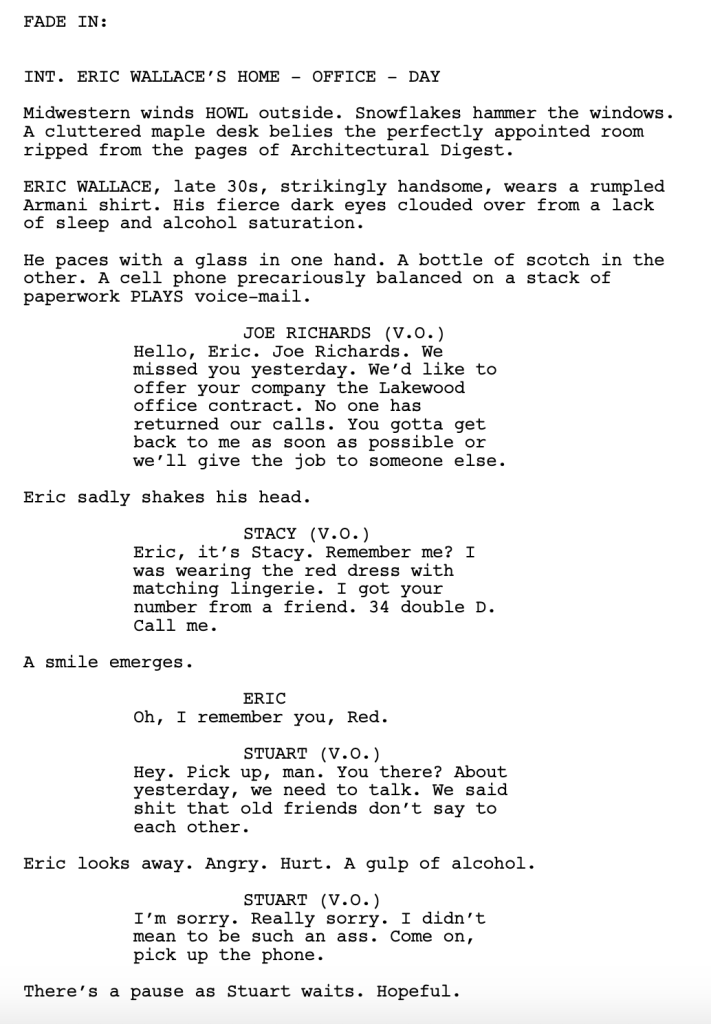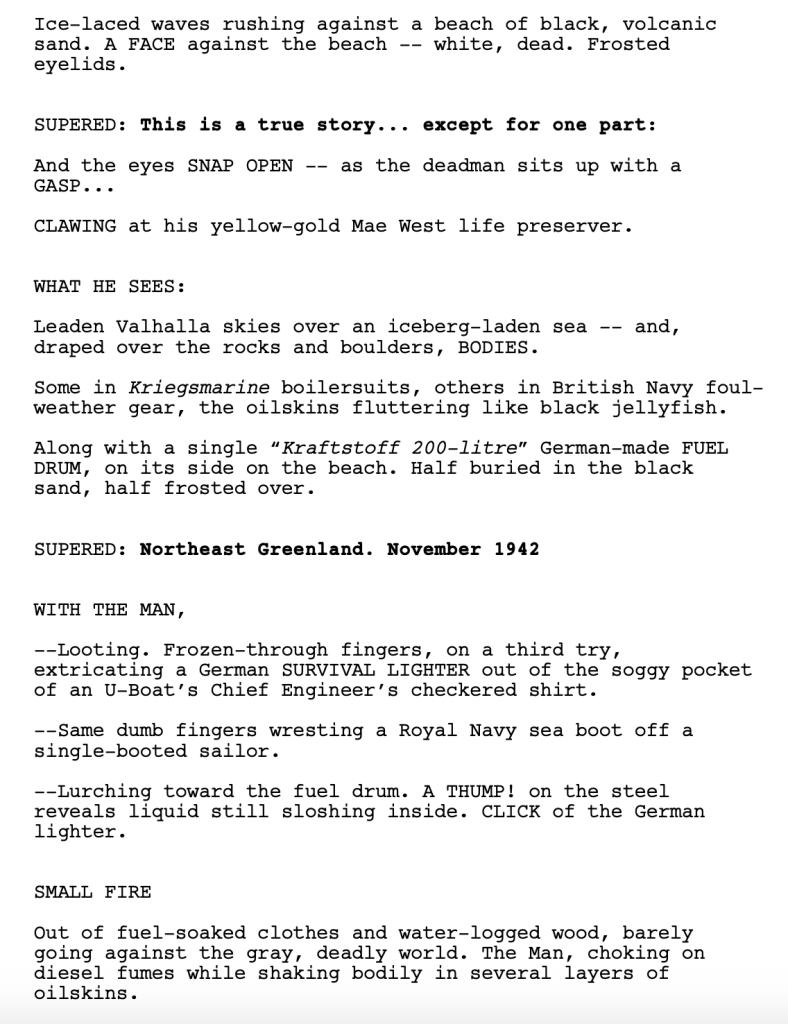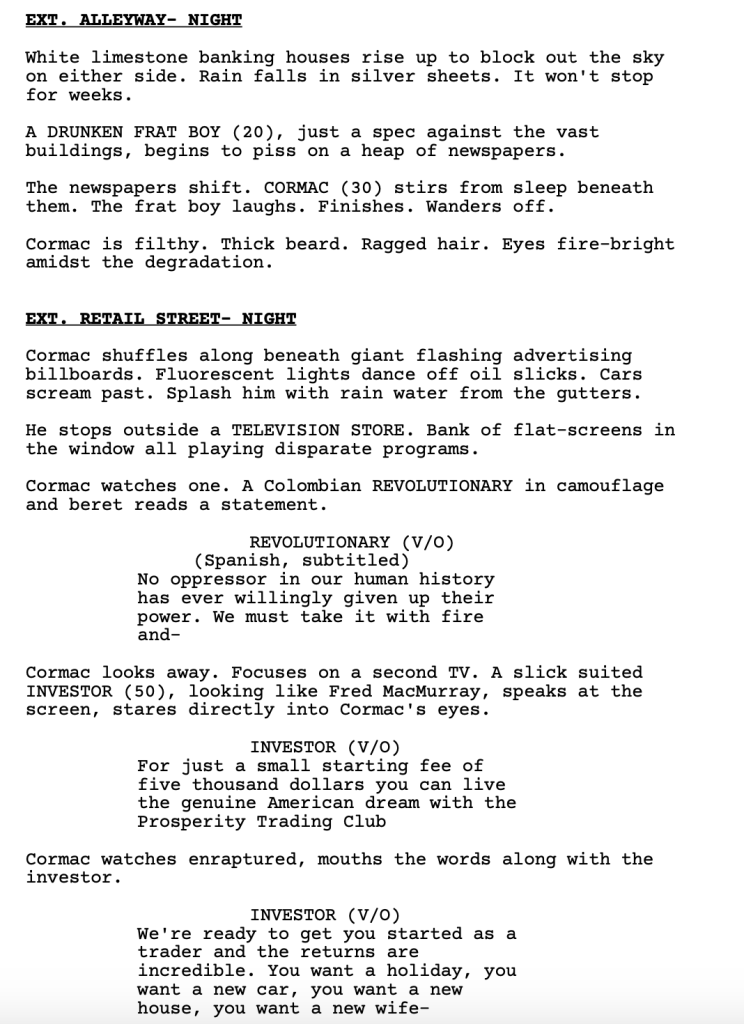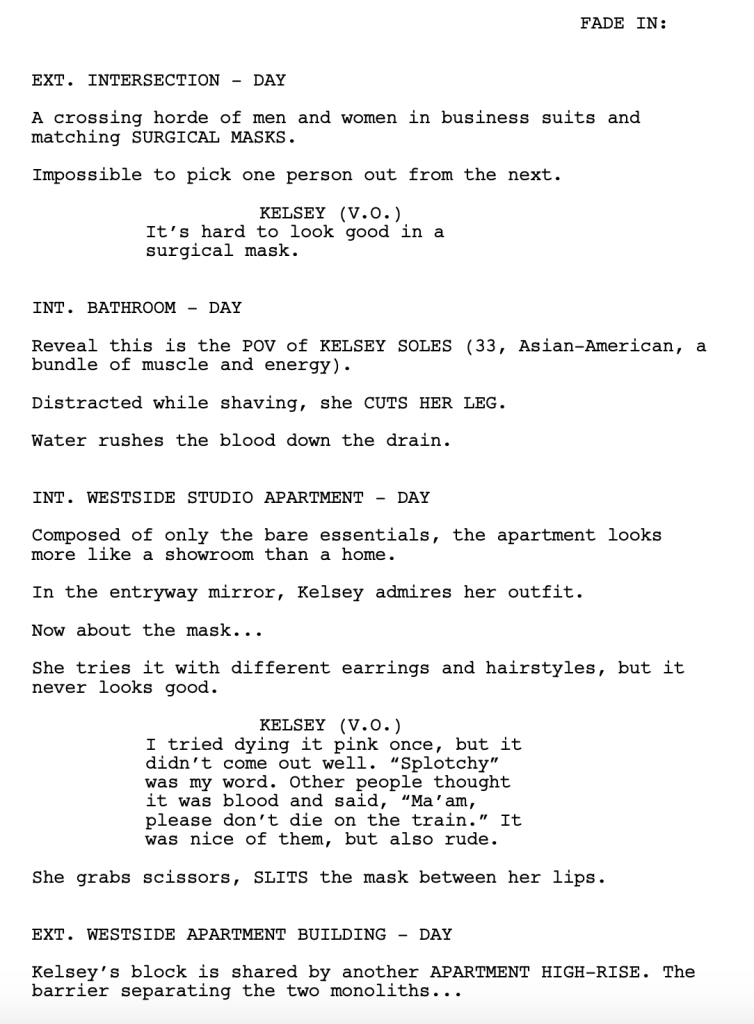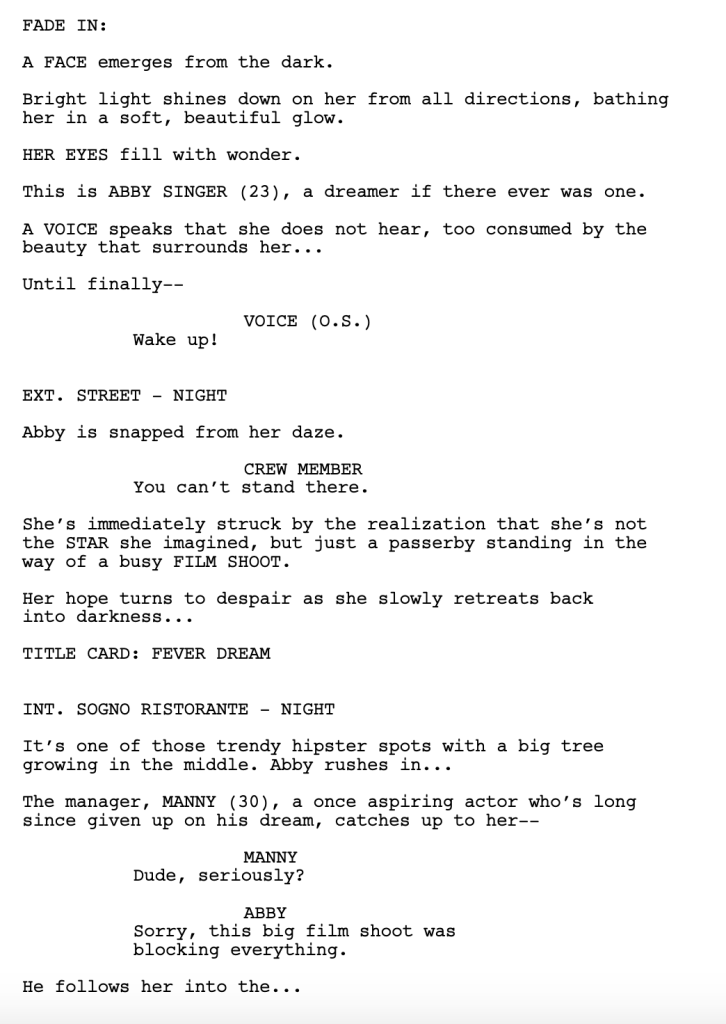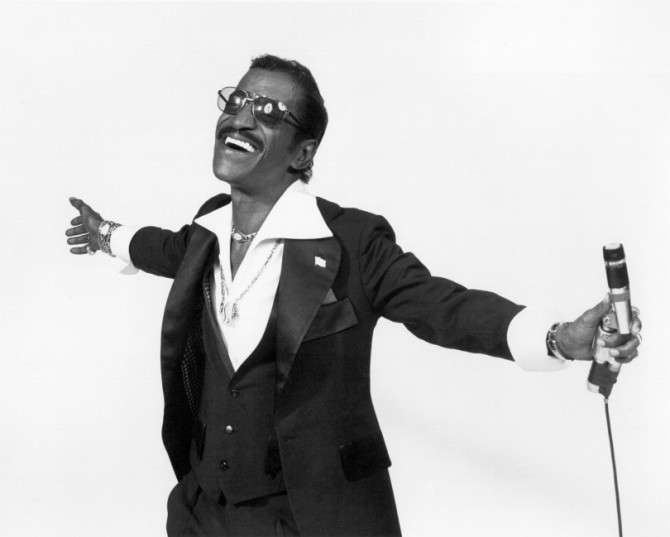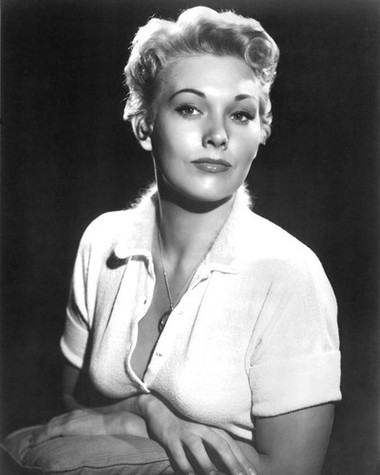Search Results for: F word
I was talking to a screenwriter the other day and we got on the topic of reading scripts. I asked her how many scripts she’d read this year. Her answer surprised me. She said, “How many have I finished or how many have I read in total?”
“Uh, how many have you read in total?” I responded, a little confused.
“About 60.”
This is the moment when I remind you guys how important reading scripts is for a screenwriter. It is where things you could never quite define which annoyed you in movies all of a sudden become clear. It is where you decode the screenwriting matrix.
I am not being hyperbolic here. Reading scripts is almost as important to your screenwriting education as writing them. That’s because you can keep making the same mistakes again and again if all you’re doing is writing scripts. It’s only through objectively seeing mistakes in other screenplays that you learn to correct your own.
I still remember this writer years back who was decent but lacked the skills to truly bump his screenplays up to a professional level. His biggest issue was a lack of detail. His scripts and his dialogue were always way too sparse. I’d tell him that if he wanted to improve this weakness, he needed to read scripts. But he didn’t see the point. Why wouldn’t I spend that time writing, was his argument. Fair enough. I’m not going to chain you down and force you to read if you don’t want to.
As it so happens, he went on to sell a script. It was a script I was familiar with and, to be honest, I was surprised. It was a fun concept but it had the same problem. It lacked depth. It was like a human being without any muscle. If he’d read a lot of screenplays, I have no doubt he would’ve known how to fix this.
But wait, Carson. He sold the script! Isn’t that what we’re all trying to do here? Didn’t he win the lottery? It depends on your definition of winning. As it happens, he spent the next three years trying to get work in the industry but was unsuccessful. He then tried to go back into spec-writing but none of his scripts went anywhere. He would eventually quit.
And while there’s no way to attribute any individual’s success or failure to a single variable, I’m convinced it’s because he never read a script. You don’t truly know how to write a screenplay until you’ve read a bunch of them. And not scripts from produced movies. Unproduced stuff, both good and bad.
Back to my conversation with the other writer, I asked her the obvious question: “And how many did you finish?”
“Three,” she said.
“Three??”
“Yeah,” she said, as if the answer were obvious.
“Why only three?”
“Because the other ones were either bad or boring.”
Okay, so here’s the thing, people. In the real world, as media consumers, all we have to do is either like something and keep watching it, or dislike something and stop watching it.
But that approach does not extend to the practice of reading scripts. When it comes to screenplays, you will probably learn more from the bad ones than the good ones. This is because you are bad. Or, to be more politically correct, you’re not yet good. And when you’re not good, you need to be shown other not good things on a consistent basis before those things register in your brain.
This is especially true if you’re new to this. If you’ve written under four scripts. You are of the belief that your screenwriting is a lot better than it is. I’m not saying your *writing.* Your writing may be great. I’m talking about screenwriting, this weird hacky version of writing that seems designed to make reading as unenjoyable as possible. You need to learn to perfect *that.* And seeing it done wrong over and over again is what helps it stick in your brain so that you don’t make the same mistakes yourself.
I’m in a unique position because I have a job where I’m required to read to the end of every script. If I wasn’t, I would admittedly bail on a lot more scripts. But it’s because I can’t bail that I’m able to talk about 683,000 different screenwriting topics a year. It’s because I’ve read a bunch of screenplays all the way to the end regardless of whether I liked them or not.
Only reading to the end of good scripts can be detrimental. Because when you read something great, everything about screenwriting feels easy. But it’s fool’s gold. What you’re experiencing isn’t an influx of skill. It’s an influx of excitement. You read something great so you want to write something great. And that kind of thing is awesome if you’re looking for motivation. But it’s not teaching you as much as the scripts that are bad. Or the scripts that are boring.
When you consistently read boring/bad scripts, what’ll happen is you’ll start identifying what doesn’t work in a clearer way specifically because it makes you so angry. Then, what happens is, you’ll be writing your own script a week or two later, and you’ll come across a similarity in your story to the script you disliked.
For example, maybe you hated the main character in the bad script because they were whiny. Now here you are in your script realizing that your hero could be categorized as whiny as well. This will immediately send you into defensive mode. “Well my character is different because a, b, c. And also, that script was a thriller and mine is a drama so it’s a different situation.” You’ll then keep writing but a few days later, you can’t get rid of this feeling that your character is just as annoying as that character you hated.
Now maybe you change your character and maybe you don’t. But the important thing is THAT YOU HAD THE CONVERSATION. Someone who doesn’t read scripts doesn’t have that conversation. They ignorantly assume their hero is fine because they wrote them and they’re a good writer so of course the character works. Without the experience of being bored by others’ writing, you challenge your own writing a lot less. That means you’re likely pushing an inferior product.
Some of you may say, “I watch plenty of bad movies, Carson. That’s where I learn what doesn’t work.” Sorry. Nope. With a movie, nothing is required of you. It’s a passive experience. Reading a script you dislike? That’s an active experience. You have to work to get through those pages. So it forces you to be more astute. And your anger at having to work for it actually benefits you. You see those things you dislike and because you’re being forced to endure them, they become tattooed to your brain. You say stuff to yourself like, “I will never ever do that in a script.”
But it’s more than that. With writing, you have to learn how to entertain people with words alone. You don’t have beautiful actors. You don’t have Academy Award winning cinematographers who make everything look beautiful. You don’t have an awesome score playing in the background. You have words. And using only words on a page is the hardest way to entertain people with a story. So you have to read the really bad scripts to learn what doesn’t work. To learn what not to do yourself.
So how many scripts should you be reading? At minimum, five a month. That’s only 60 a year. And that means reading the whole way through. No matter if they’re boring. No matter if they’re bad. And I got news for you. A majority of them will be. But that’s going to ensure that your scripts are neither of those things. :)
Genre: Comedy
Premise: Best friends and former time travelers Bill and Ted are called back by the heavens to save the world. All they have to do is write a song that unites every single person on the planet. And they’ve got 77 minutes to do it.
About: They have been trying to make this movie forever. I think since the late 90s. But Keanu was becoming a huge star and didn’t have the time. I believe that changed when Keanu hit that rough patch, doing 10 years of DTV work. Finally, he had the time to do another Bill and Ted movie. Ironically, that’s right when his career picked back up again with John Wick. But Keanu kept his promise to his buddy Alex Winter and here we are. These are also the original screenwriters from Bill & Ted’s Excellent Adventure.
Writers: Chris Matheson and Ed Solomon
Details: 90 minutes
The Keanusance?
Is that what they’re calling it?
Hey, as long as I keep getting Matrix and John Wick movies, I’ll call it whatever you want me to. The Keanuback. Return of the Kean Bean. Kicking it with Keanu. Tune My Piano Keanu. Hmm… maybe not that last one.
Bill and Ted are in their 50s and still plugging away as the group, “Wild Stallyns.” But things aren’t going well. The former Billboard-topping Stallyns can barely get wedding gigs these days. To make matters worse, they were told as teens they would write the song that unites the world. Except they still haven’t written it! Here’s co-writer Solomon on this writing choice (via Daily Dead)…
“I’ve always felt that comedy is best when it comes from one of the more negative, let’s call it emotions: sadness, despair, anxiety, fear, whatever. And the guys were feeling those things. In a weird way, we said from the beginning, “Let’s make a feel-good comedy about failure. Let’s make an absurd, silly, ridiculous, funny movie about dashed dreams and disappointment. And let’s have it end where you feel really good.”
Bill and Ted are then visited by an agent of Heaven (I think Heaven?) and brought to the city in the clouds, where they’re informed by some queen woman that time is up. They must write the song that unites the world… WITHIN 77 MINUTES! Should they fail, time and space, which are already starting to implode, will cease to exist.
Freaked out, Bill and Ted have no idea how they’re going to write a song in 77 minutes that they’ve been trying, and failing, to write for 30 years. But they realize they have a hack. The time machine! They can go into the future and take the song FROM THEIR FUTURE SELVES, who have already saved the world. Isn’t that stealing, wonders Ted. “Not if we’re stealing… from ourselves,” Bill points out.
This begins a trip deeper and deeper into the future to find the Bills and Tedss who have written the song. But the more Bills and Teds they visit, the more they’re lied to. It seems like nobody has the song. Could it be that they actually have to figure it out for themselves??
Meanwhile, Bill’s and Ted’s excellent 20-something daughters, Billie and Thea, who happen to be aspiring musicians, sense that their dads are in trouble and hijack a second time travel machine where they go BACK in time and recruit some of the best musicians ever – Mozart, Jimmi Hendrix, Louis Armstrong, Kid Cudi – to help their dads. Of course, we begin to suspect that this crazy adventure was never about the dads in the first place. It was really about… THEM!
Oh, and let’s not forget that Heaven secretly needs to kill Bill and Ted so they create a killer robot and send him through time to chase and assassinate the Stallyns. You read that correctly. There’s a killer robot in this movie. So, can Billie and Thea save the world and, with it, their dads? By golly, I hope so.
Bill and Ted Face The Music will win you over by the end. But it sure tries its hardest to shoo you away in the meantime.
This was an odd project from the outset.
The fact that Keanu Reeves never makes sequels (that used to be his defining m.o.) yet he wanted to make a Bill and Ted threequel? Odd. Why Bill and Ted of all his properties? It’s not even like he made the first movie then wanted to revisit the fun of it, like Jim Carrey did with Dumb and Dumber Too. He’d already made a sequel.
As one of you pointed out after the latest Kevin Smith debacle (“Moochie and Spoochie Road Trip Shenanigans”), watching 20-somethings curse up a storm is funny. Watching 50-somethings do the same thing isn’t nearly as funny. Same problem here. Bill and Ted talking like dumb 20-somethings when they’re in their 50s makes for an uncomfortable experience.
Speaking of uncomfortable, did Keanu film all his scenes right after doing a day of John Wick stunt work? Why is he limping around half the time? Or struggling to walk from one end of the room to the other? It certainly doesn’t help sell the nonchalant “Yeah dude” persona he’s supposed to be exuding.
Something I realized while watching Face the Music, though, is that time travel works better with comedy than it does straight sci-fi. That’s because time travel never makes sense when you think about it. You go back in time to fix something but, by doing so, don’t you alter the course of history, essentially creating a second timeline? And doesn’t that mean the original timeline still burns? A butterfly flaps its wings and all that?
The nice thing about comedy is the audience doesn’t hold you to that same impossible standard. That’s because, in a comedy, laughing is more important to the audience than logic. In other words, you have more leeway.
But even Bill and Ted leaves you stumped at times with its time travel paradoxes. We’re told they only have 77 minutes to find the greatest song ever (the “U” in GSU – “Urgency”) yet they can travel through time. So doesn’t that mean they have unlimited minutes? Why does every minute that passes during time travel equal an actual minute in Heaven? Isn’t Heaven timeless?
Again, it’s annoying, but if you’re laughing, it doesn’t matter.
And Face the Music starts making you laugh later when it loosens the reigns. The daughters are surprisingly fun to watch, especially the one who plays Ted’s daughter. She somehow both sounds exactly like Keanu circa 1991 and adds her own weird take to the impersonation. I also loved Death’s scenes. One of my favorite lines is when they catch him playing hopscotch by himself and Ted realizes, “He’s cheating!” Death cheating at hopscotch when no one else is around is hilarious. But my favorite character was the one I initially hated the most – the killer robot. Once he fails at his mission and just wants to be one of the guys, I fell in love with him. He was so funny.
Also, some movies are lucky to come out at the exact time they’re needed. And Face the Music fits that description to a tee. Things are a bit charged up in our world to say the least. Having two goofballs go on a mission to unite the planet… well that’s a bit serendipitous don’t you think? Even the subpar “song that unites the world” couldn’t derail the good vibes that flowed from the final scene.
The strangest thing about this movie is that it tells us nothing about the movie business. It’s such an outlier in so many ways that it’s hard to formulate any “larger picture” thoughts on the film. And maybe that’s the point. This movie was made for one purpose and one purpose only – to bring a smile to your lips. And at that, it succeeds.
[ ] What the hell did I just read?
[ ] wasn’t for me
[x] worth the rental (at 6 dollars, not 20 dollars)
[ ] impressive
[ ] genius
What I learned: When you write comedy, you have to be willing to take chances on the absurd. Comedy is the one thing in writing that you can’t argue with logic. Something is either funny or it isn’t. So if you’re stringently controlling every joke you write so that it works on a technical level, expect audiences to be unimpressed. A killer robot makes ZERO SENSE in this movie. It’s a “way out there” idea. But it ends up being the most interesting and funniest part of the movie. So play with absurd ideas in comedy. That doesn’t mean some of them won’t be stupid and you shouldn’t come to your senses and ditch them later. But if a joke/choice shouldn’t technically be working yet it is? Don’t question why. Keep it in there.
Your nights have been lonely. Your days? A pastiche of whimsical memories fading into each other like snowflakes drifting down to their sad thawed demise. Am I talking about your life since Covid? Nope. I’m talking about your life since Amateur Showdown.
But that changes today because AMATEUR SHOWDOWN IS BACK!
Like an old friend you’ve lost touch with who calls and screams, “I’m in town for one weekend. Let’s get wild!” That’s what Amateur Showdown has done. “Oh, don’t you worry. We’re going to get wild, Amateur Showdown. We’re going to get wild in ways that aren’t allowed on television!” That’s because this Amateur Showdown is the craziest of them all.
Character Piece Showdown.
Uh-huh. You read that right. How much more juicy does it get than introspective character exploration? Not even The Daily Mail will touch this it’s so risque.
I’ve been on the phone all week talking with frustrated advertisers. “Carson,” the CEO of Coca-Cola, Jerod Moss, said to me. “How can I post ads on your site when you’re talking about character flaws, inner conflict, the Hero’s Journey for God’s sake, Carson. The Hero’s Journey! How do I spin that to board members!?”
Believe me, it hasn’t been easy. I nearly canceled. I can’t have this kind of controversy following me around. But unlike Rick, I do stick my neck out. And despite the rabid protests outside my place demanding I not mention “character” and “piece” in the same sentence or I will face consequences, I’m moving forward. And I hope that you move forward with me. Cause I can’t do this alone.
That reminds me. The next Amateur Showdown will be October 16th and it will be a HORROR SHOWDOWN. Yes. We’re going to drape ourselves in the color of blood and indulge our inner freak show, all in time for Halloween. And don’t forget, you can enter SHORT HORROR STORIES as well as Horror scripts. So, if you’re going to enter, send me a title, logline, genre, why we should read your script/story, and a PDF of the story/screenplay to carsonreeves3@gmail.com any time before Thursday, October 15th, 8pm Pacific Time.
Now on to today’s scripts. If you haven’t played Amateur Showdown before, this is how it’s done. I pick five screenplays that were submitted to me and then you, the readers of the site, read as much of each script as possible and vote for your favorite in the comments. The winner will receive a review the following Friday that could result in props from your peers, representation, a spot on one of the big end-of-the-year screenwriting lists, and in rare cases, a SALE!
One last thing. This was one of the harder Showdowns to choose contestants for. A lot of you took the term “character piece” very liberally. The generes for these scripts were all over the map. I had to make some tough decisions on if picks were right for the showdown, but if you didn’t get picked, it was probably because I didn’t consider your entry “character piece” enough.
Anyway, good luck to all!
Title: The Wallace Web
Genre: Drama
Logline: When Eric’s business partner confesses that Eric’s dad has been paying him to ruin their company, Eric enlists the help of his estranged brother to confront their overbearing father.
Why you should read: When I was 18, my first job was the receptionist at a property management company. One of my many responsibilities was to accept contractor bids, log them in, and make sure they went into the correct job basket. One day a contractor handed me his bid proposal and asked that I pull his son’s bid for the same construction job. I politely told him no. He came back the next day with flowers, trying to bribe me to take his son out of the running! Who does that? I lied and told him the bids were already collected. His nice demeanor turned angry in an instant. I always wondered what the story was behind that family. Family and business are always good drama. I’ve had feedback from readers including “best dialogue ever” and another one called it the next “Warrior”. Thanks for reading my submission. I’m grateful for all the comments and suggestions.
Title: Dog Sled Patrol
Genre: Thriller, Period drama
Logline: In 1942, the sole survivor of an u-boat-destroyed British arctic convoy is paired with a native Inuit hunter on a months-long journey across the frozen wasteland of Northern Greenland. Before reaching civilization, they must survive the unforgiving conditions, an outside threat lurking in the dark — and the fact that one of them is not the person he says he is.
Why you should read: It’s World War 2, and you and your partner are on a patrol in one of the coldest, remotest, most desolate parts of the world — months of travel from the nearest outpost, in the deadly cold of a polar night, with only your 13 dogs for company.
To survive on the ice riddled with deadly traps of open-water “leads”, with white-coated terrors stalking just out of the view of your fading headlamp and the constant threat of a submarine Nazi incursion looming behind the icebergs, every “day” of the endless night you put your life in your partner’s hands — and him in yours. You get to know the other man closer than your own brother or a lover. One night, in your tent… he starts speaking German in his sleep.
Title: Few Die Well
Genre: Thriller
Logline: After a homeless veteran murders a banker in self-defence, he impersonates the dead man in an effort to land his dream job and lift himself out of poverty.
Why you should read: I’ve always been fascinated by stories of conmen and imposters, individuals for whom every word is fraught with the risk of discovery. Few Die Well charts the consequences of one penniless outsider’s attempts to claw his way up to the top through an elaborate lie of his own. He enters a world of staggering wealth and savage violence as he finds himself drawn into the orbit of scheming grifters, crooked cops and ambitious politicians. Its inspirations are myriad, the film noirs of the 1940s and 50s, the gritty crime dramas of the 1970s and the recent spate of intelligent thrillers like Nightcrawler and Parasite. In writing this screenplay, I set out to craft a character piece that has GSU at its core, that moved at a rapid pace without sacrificing development and depth. It comes in at a slim 87 pages and it ends with a bang.
Title: Love Sick
Genre: Character Piece / Romance
Logline: A door-to-door saleswoman struggles to keep her new relationship with a young journalist alive when she is forced to medically quarantine.
Why you should read: You may have noticed there was a quarantine going on for a while a few months ago. That’s to say that this script is insanely topical. Probably almost too much so. But maybe, just maybe… it’s also exactly the type of script that needs to be read right now: An introspective look at what it means to be human when the world goes to shit around you.
Title: Fever Dream
Genre: Psychological Thriller
Logline: After being assaulted, a struggling actress with a traumatic past gives a riveting audition, landing the lead role in a film. But the more she delves into the dark mind of the character, the more her dream becomes a nightmare.
Why you should read: Let’s face it, you gotta be pretty crazy to try and have a career in this industry. Most of us spend all our time working for free just in the hopes of one day getting a job that actually pays us. Well, after writing and directing my first feature (which landed a distributor, had a theatrical release, and even sold to Showtime), I actually thought I was on my way. And then… crickets. As far as the industry was concerned, no one f-ing cared. It was back to staring at the blank page all over again, hoping this time things would somehow be different. That’s when I realized how crazy this whole thing is, and when the idea for my new film was born.
Fever Dream is a timely, taut thriller that grabs you by the throat and never lets go. It’s a wild cross between Black Swan and Mulholland Drive that forces you to question how far you’re willing to go to achieve your dream, and at what price, and has an ending that will leave you breathless and wanting to go back and experience it all over again. Thanks for giving it a shot!
Conquer exposition once and for all!!!
It’s been a while since we’ve talked about exposition. The reason for that is, most writers who’ve broken into the professional ranks don’t have exposition issues. They might be struggling with other aspects of storytelling. But exposition is, for the most part, a beginner and intermediate problem. Therefore, I’m not running into tons of exposition issues in the pro scripts I review.
But when I’m reading the Last Great Screenplay Contest entries, I’m seeing exposition problems all over the place.
Why is exposition a problem? Well, the number one reason exposition is problematic is that it’s a dialogue killer. You can’t focus on the more advanced things that make dialogue work if you haven’t mastered exposition.
So what is exposition? Exposition is any information about your characters or plot that you’re trying to fit into your dialogue. So, for example, if it’s important that the reader know your character was a former karate champion (because, later in the movie, he uses karate to beat someone up), exposition would be two characters mentioning, early on in the screenplay, that this character used to be a former karate champion.
The super beginner screenwriter might formulate the conversation like this…
DOUG: Hey, how’s the karate coming along?
FRANK: Oh, I haven’t done that in years.
DOUG: But you used to be a champion, right?
FRANK: That was a long time ago.
Extremely on the nose, right? A more experienced beginner might tackle it this way…
DOUG: Guess who I ran into today? Bill Lane. He mentioned that old karate tournament you used to compete in. We were trying to remember where it was.
FRANK: Encino.
DOUG: Right. Encino. Anyway, he was telling me he just got divorced…
A teensy bit better. But still bad.
What I’m going to do today is cover two strategies you should always consider before using exposition. Then I’ll go into the two main approaches I endorse for writing exposition.
Let’s start with the strategies. The first strategy you should consider when facing exposition is not including it at all. Most of the time we THINK we need exposition when we don’t. Let’s say you’re writing a Fast and the Furious type script and you feel like you need to establish that your hero, MIKE, has an extensive history with a character who will be appearing in the story later, DERONIS. Maybe they sold drugs together, raced cars together, STOLE cars together. Whatever.
So you include a scene early on where Mike is talking to his wife and says, “I’m going to have to see Deronis this weekend.” We can tell his wife isn’t happy about this. “When was the last time you talked to him?” “Barbados. ’04. When he was running Kamikaze’s business.” “When he ratted you out.” “Yeah.”
This isn’t the worst dialogue but you have to ask yourself, do you really need it? Consider the alternative. Don’t mention any history between the two of them and then, when they meet, Deronis says, “Hey Mike.” “Hey.” “Haven’t seen you since Barbados.” Mike offers a tight smile. And that’s it. Or, you don’t even need the Barbados part. “Haven’t seen you in a while,” followed by a tight smile. That gives us all the information we need. These guys have a history and it isn’t all good. This should always be your first weapon against exposition. Cause the best exposition is no exposition.
Strategy number 2 is show us rather than tell us. If you have to use exposition, come up with a visual way to do so. And no, that does not mean cut to a karate champion trophy to convey that the character is a karate champion. Or, one of my favorites, the “series of pictures” to show what’s gone on in the family. The first picture is a happy family of four. In the second picture, placed next to it, the mother is bald and pale. And in the third picture, it’s just three family members, the mom dramatically gone (I can’t tell you how many times I’ve encountered this). Sure, these are viable ways to convey information in a pinch. But that’s not what I’m talking about.
I’m talking about if you’re writing Star Wars and you want to convey that Darth Vader is the most feared man in the galaxy, you don’t have two characters discussing all of the awful things that Darth Vader has done in the past. You simply show Vader demanding information from a Rebel soldier and when the soldier doesn’t reply, Darth Vader lift him up off the ground and crack his neck. Showing us that is better than anything you can tell us about Vader.
But let’s say there’s information you really feel that the reader needs to know. And there isn’t any natural way you can provide the information by showing. In that case, you want to use the “Spotlight and Shadow” approach. The big mistake newbie writers make when writing exposition is that the exposition becomes the reason to write the scene. As a result, the scene feels utterly unnatural. The reader senses that the only reason the characters are talking is to give information to them. In this case, you are spotlighting the exposition.
What you want to do instead is play exposition out IN THE SHADOWS. The thing you should be spotlighting is the ENTERTAINMENT. A character wants something in the conversation. That something has stakes attached to it so it feels important. There’s conflict. There’s drama. And for those reasons, the scene is fun to read. What the reader doesn’t realize, however, because you’ve put the spotlight on the entertainment, is that IN THE SHADOWS you’re disseminating exposition.
The example I always love to use is the scene in Ferris Bueller when he calls his sick friend, Cameron, and tries to convince him to ditch school with him. The spotlight is 100% on the entertainment. Ferris has a clear goal. Convince his friend to ditch school. His friend doesn’t want to, which creates conflict. And so all we’re focused on is whether Ferris is going to convince his friend or not. Meanwhile, we get exchanges like this: “If you’re not over here in 15 minutes, you can find a new best friend.” “Ehh! You’ve been saying that since the fifth grade.”
That line is exposition. It just told the audience that these two have been best friends at least since the fifth grade. But even the keenest moviegoer probably wouldn’t have identified that moment as exposition. It’s just a natural extension of the conversation they’re having. AND THAT’S THE POWER of the spotlight and shadow approach. The spotlight is so far over here on whether Ferris is going to achieve his goal or not that all exposition is happening in the shadows.
The beginner writer would’ve made Ferris and Cameron’s backstory the spotlight of the scene. Ferris might’ve called Cameron just to see what he was doing. And now, the beginning screenwriter thinks, I can get them talking about their past. So Badly Written Ferris says something like, “Do you remember when we first met?” Badly Written Cameron replies, “Of course. Fifth grade English class.” “Missus Baxter.” “Oh, she was the worst!” “She smelled like fungus. And what did I say to you after you failed that test?”
Is that the worst dialogue? I don’t know. I guess it’s not bad. But what is bad is that all we’re focusing on here is learning things about the characters that the writer wants us to know. That’s what you’re doing wrong. The spotlight is on the wrong thing. You need to spotlight an entertaining scene and then hide your exposition in the shadows of their conversation.
Okay, but what happens when you need to convey SO MUCH EXPOSITION that there’s no shadow big enough to hide all of it? You usually run into this problem in heavily plotted movies where you need to tell the audience a bunch of information about the plot so that they understand what’s going on.
An obvious example would be a heist movie where the group has to explain to the audience things like what time the bank closes, what the group has to do once they’re inside the bank, what each individual person’s job is. If you don’t tell us these things and just jump to this heist, we’ll likely be confused about what’s going on. You see these scenes all the time in the Mission Impossible movies.
If you’re in this situation, I want you to use a device similar to the spotlight and shadow approach. I call it the ‘balancing scale.’ You know what a balancing scale looks like. It’s got two plates, one on each side. We’re going to call the left side the ‘entertainment’ side and the right side the ‘exposition’ side. Whenever you’re writing one of these scenes, make sure that the entertainment side is always more weighed down than the exposition side.
Where writers make the mistake is that they pile too much exposition onto the right side of the scale. Writers will use the term, “exposition dump.’ It’s a term I detest. Never ever write a scene whose only purpose is to dump exposition. EVER! You can always make a scene entertaining. Even ones with lots of exposition. And the more the left side of the scale (the entertainment side) can outweigh the right side, the less people are going to realize the exposition.
Unfortunately, it’s never clear how to create the entertainment side of these scenes. You have to be creative. One trick I like to use is to see the scene as its own little movie. And how do I tell a story (that has a beginning, middle, and end) within this scene. The scene where Doc teaches Marty about his time machine could’ve easily been an exposition dump scene. A bad writer would’ve had Doc call Marty over to his garage where he very casually showed him the time machine and explained how it worked.
Instead, the writers start the scene off with a mystery component. What is Doc going to show Marty (the beginning of our mini-movie)? Then, instead of Marty being a passive participant, the writers make him active. Doc has him record the demonstration for historic purposes. Then, we do a test run. So there’s an exciting element to whether the test will be successful or not. The focus at every point is on the entertainment.
In the meantime, the writers are slipping exposition into the crevices of the scene. One of the most important pieces of exposition in the movie is how the time traveling works, from the three separate timing displays to the 88 miles per hour. Again, the scene is designed so that Doc is making Marty tape all of this for prosperity’s sake. The reason he’s showing him these displays is not because he wants to. It’s because he has to. The time travel needs to be documented.
That scene has more exposition in it than any scene you will ever write. So if they can do it, you can do it too. It just takes work. Believe me, I know it’s easier to sit two characters down in a chair and have one reel off the 20 time traveling rules to the other. It takes zero thought. But if you want the reader to actually enjoy themselves, you need to do the hard work of entertaining them as opposed to educating them.
Now get back into your screenplays and banish all that exposition!
Good luck!
Carson does feature screenplay consultations, TV Pilot Consultations, and logline consultations. Logline consultations go for $25 a piece or $40 for unlimited tweaking. You get a 1-10 rating, a 200-word evaluation, and a rewrite of the logline. They’re extremely popular so if you haven’t tried one out yet, I encourage you to give it a shot. If you’re interested in any consultation package, e-mail Carsonreeves1@gmail.com with the subject line: CONSULTATION. Don’t start writing a script or sending a script out blind. Let Scriptshadow help you get it in shape first!
Genre: Period/50s
Premise: The controversial relationship between Sammy Davis Jr. and movie star Kim Novak, an interracial celebrity pairing at a time when interracial relationships were outlawed in half of America.
About: This script won the Austin Film Festival screenplay contest. It also finished in the finals of the Nicholl Fellowship (but was not one of the winners). This draft of the script (which was in the contests) was written by Matthew Fantaci but is currently being rewritten by Janet Mock, who wrote on “Pose,” the Ryan Murphy show that chronicles the downtown social and literary scene in 1987 New York.
Writer: Matthew Fantaci
Details: 95 pages
I’ve always seen Sammy Davis Jr. as a curiosity. He was so unique that at times, he appeared cartoonish. Maybe that’s why I was never into him. But there’s no denying that the Rat Pack days were unlike anything we’ve seen before or since in Hollywood. Here in the 21st century, you get more of the Entourage approach. One famous guy and a lot of Turtles.
So I popped this one open with a doubtful click, hoping it would win me over.
It’s 1950s Vegas. Sammy Davis Jr. is one of the most popular entertainers on the planet. Black, Jewish, and Puerto-Rican, he was truly one of a kind. And boy could he light up a room. Ironically, back then, Sammy couldn’t even stay at the hotels he performed at. Black people weren’t allowed rooms.
Meanwhile, Kim Novak had become one of the biggest movie stars in the world. But unlike other stars, Novak was rebellious. You see, back then, everything about your person was crafted by studio heads. Novak was known by the world as “The Lavender Girl.” Yet she hated lavender. And the fact that she openly rejected the label infuriated her handlers.
One day, after a Sammy performance, he bumps into an exhausted Kim, who’s just finished a long photo shoot. Kim doesn’t have the strength to bullshit and falls into a natural friendly conversation with Sammy. It goes so well that the two start hanging out regularly. And then sleeping together. Which normally would be great. Except that in 1950s America, nobody accepted interracial relationships, especially one between a black man and a white woman.
When Columbia studio head and evil bully Harry Cohn gets word of this, he calls Kim in and tells her that if she doesn’t end this before the gossip columnists get hold of it, he’s going to ruin her life. Although I have not wikipedia searched Harry Cohn, the script paints him as some combination of Harvey Weinstein and Hitler. So when he says he’s going to ruin someone’s life, you get the impression he means it.
Despite that, Sammy and Kim decide to take their romance semi-public, appearing at friends’ parties together. There’s only one step left to go and that’s to date in public. The two discuss what this step means and concede that there’s no coming back from it. So if they’re going to do this, they have to make sure they REALLY want to do it.
The pressure eventually overwhelms them, however, and they give in to the threats (even coming from Sammy’s friend Frank Sinatra), splitting up. It’s a decision that will leave both sides wondering “what if” for the rest of their lives.
If you’re going to make a commentary on a hot button social issue, I think this is the way to go. You don’t give us a non-fiction retelling of whatever’s been popping up on our news feeds for the last 83 days. You explore a story that has similar themes and overlap with the hot button issue, but because it’s not the exact same, it forces the reader to think to make the connections. It makes the audience feel like they’ve solved a puzzle, which is more fun than having someone place a Rubik’s Cube in front of your face that’s already completed.
But I can never discuss these scripts without going back to my frustrations with the biopic format. While I like that this isn’t a cradle to grave Sammy Davis Jr. story and that, instead, we’re seeing this specific charged section of his life, I still spent half the read wondering, “What is the point of this? Where are we going? Where’s the goal?”
The only thing pushing the story along is “Will they or won’t they?” And while it’s certainly more charged than the storylines we typically get in “will they or won’t they?” (romantic comedies), I still felt a slow narrative that left me wanting more. I need that character goal. I needed Sammy to be going after something.
Since he’s not going after anything, all his scenes are some variation of waiting for when he’s going to see Kim next.
And don’t get me wrong. It’s possible to make these narratives work. The script is packed with conflict. And it has one of the better villains I’ve read in a while in Harry Cohn. But it’s still anchored down by that dull rickety story engine known as “Will they or won’t they?”
Getting back to Sammy, he’s a real tough guy to take seriously. He was such a character in real life that I found myself struggling to see him as a romantic man trying to engage in a relationship. It’s like trying to imagine Charlie Chaplin in a relationship after watching Modern Times. Or David Blaine confessing his love without eating a live frog and then having it jump out of his ear.
But if you’re into this era, into old Hollywood, into the Rat Pack, you’ll probably love this. It even feels like an old fashioned movie, with the quick witty dialogue banter between Sammy and Kim that was popular in movies at the time. The combination of an era I was never a huge fan of with the evil genre known as “biopic” prevented me from ever getting into this.
[ ] What the hell did I just read?
[x] wasn’t for me
[ ] worth the read
[ ] impressive
[ ] genius
What I learned: One plotline too few. Sometimes a screenplay feels thin. One of the reasons may be that you’re one plotline too thin. You needed an extra plot engine going on, possibly with work/career. Or you needed an extra relationship to explore, something that gave you five more scenes throughout the script. That’s what Scandalous felt like to me. It needeed one more plotline to fill it out. Even the main relationship here didn’t have as many scenes as you’d expect it to have. And that left the storyline feeling thin.

